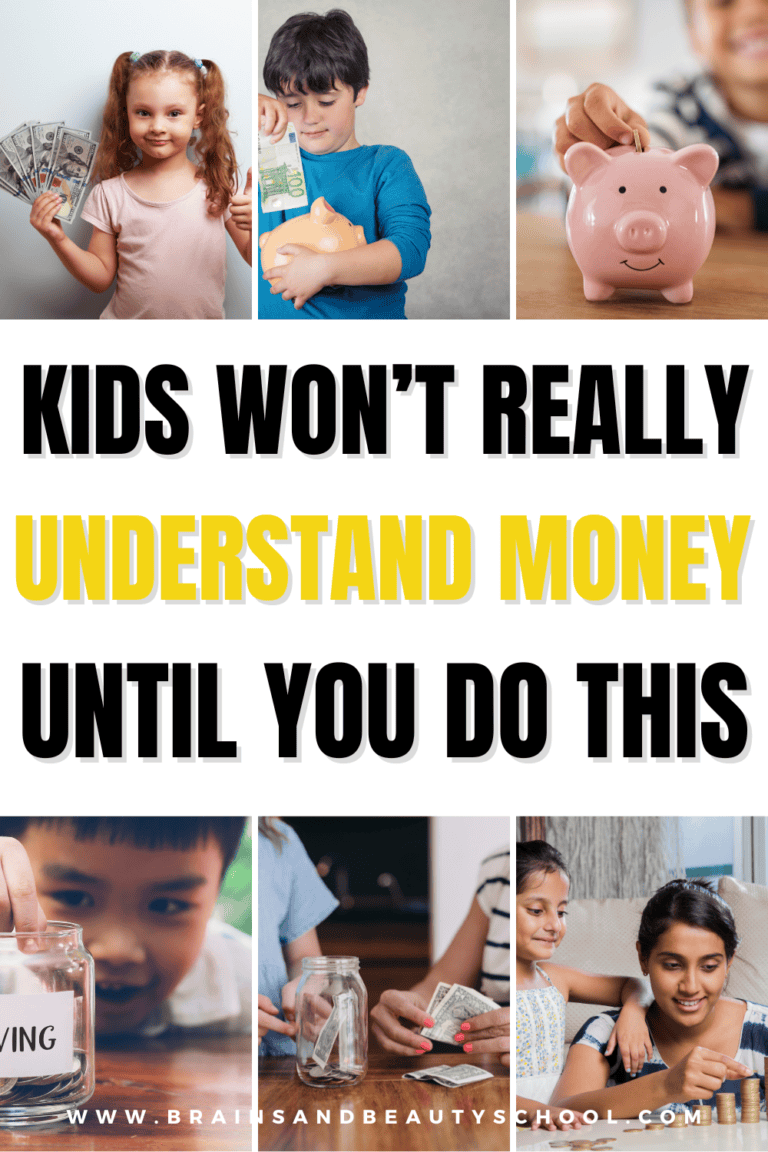To discover how to align your entire financial ecosystem, check this out.
Why Should you Teach Kids About Money
The Importance of Early Financial Talks:
Why Start Early To Teach Kids About Money?
The earlier you can begin to discuss money with your kids, the more they can consume and process the information. When you teach your kid about money, you are teaching them a valuable life skill.
Below, I start to explore this topic of why you should start having conversations about money, and teach your kid about money, early, in your child’s life.
-
- Formative Years: The formative years of childhood are a critical period for learning and development. During this time, children are like sponges, absorbing information from their surroundings.
- Impressionable Minds: Kids form their attitudes, beliefs, and behaviors by observing and interacting with their immediate environment. Early exposure to financial concepts helps shape a positive and responsible mindset towards money.
- Foundation for Life: Financial education is not a one-time lesson but a gradual process that builds over time. Starting early provides ample opportunities to instill foundational principles that will serve as a compass in adulthood.
The Power of Early Lessons:
-
- Laying a Strong Foundation: Just as you teach your child the alphabet to prepare them for reading, introducing money concepts early lays the foundation for financial literacy. Basic principles like saving, spending wisely, and understanding the value of money become ingrained.
- Everyday Learning: Daily activities, from grocery shopping to budgeting for a family outing, become valuable teachable moments. Children learn the practical application of financial concepts in real-life scenarios, making the learning experience more tangible and relevant. I talk more about this on my YourMoneyMommy Tiktok account.
- Behavioral Impact: Early exposure to financial talks influences behavior. Kids who understand the basics of money are more likely to develop responsible financial habits and make informed decisions as they grow older.
-
@yourmoneymommy the first memories your kids have of money will ultimately be dicated by the way you respond to them on certain topics. the way you formulate your answers to their requests slowly create their long term relationship with money. would you all like a longer series on this topic? how to teach your kids about money? #investingtips #yourmoneymommy #beginnerfinancetips #moneyandkids
Parental Guidance in Early Learning for Financial Success for kids:
-
- Open Communication: Create an environment where money is openly discussed. Transparency about family finances helps demystify money-related stressors and fosters a healthy understanding of its role in daily life.
- Leading by Example: Children often model their behavior after their parents. By showcasing responsible financial habits, parents become powerful role models. Demonstrating concepts like budgeting, saving, and charitable giving instills a sense of financial responsibility.
How to Start Talking to Your Kids About Money?
-
- Be Transparent: Share age-appropriate information about the family’s budget, expenses, and financial goals. This transparency fosters a healthy understanding of money.
- Everyday Teachable Moments: Use daily activities like grocery shopping or budgeting for a family outing to introduce concepts like budgeting, saving, and spending wisely.
- Set an Example: Children often model their behavior after their parents. Demonstrating responsible financial habits sets a powerful example.
Initiating Conversations to Teach Kids About Money
Once you understand the significance of early financial talks, the next step is to initiate conversations about money in a way that engages and educates your children. Here’s how you can navigate these crucial discussions effectively:
Create a Positive Atmosphere:
-
- Casual Settings: Money talks need not be formal lectures. Choose casual settings, like family dinners or walks, to introduce financial topics. A relaxed atmosphere encourages open communication.
Age-Appropriate Discussions:
-
- Adapt to Their Level: Tailor your conversations to your child’s age and comprehension level. Younger children may start with basic concepts like saving for toys, while older ones can delve into more complex ideas like budgeting.
Use Everyday Scenarios:
-
- Real-Life Examples: Relate financial concepts to everyday situations. While shopping, explain the choices made based on a budget, or discuss the idea of saving for a family vacation during travel planning.
Interactive Learning:
-
- Games and Simulations: Engage your children with age-appropriate financial games or simulations. These hands-on activities make learning about money fun and interactive.
Set Financial Goals Together:
-
- Teach Goal Setting: Involve your children in setting financial goals. Whether it’s saving for a favorite toy or contributing to a charity, goal setting instills the importance of planning and working towards objectives.
Encourage Questions:
-
- Curiosity is Key: Foster a sense of curiosity by encouraging questions. Be patient and provide simple, clear answers. A child’s inquisitive nature is a powerful tool for learning.
Use Storytelling:
-
- Narrative Approach: Narrate stories or share anecdotes that incorporate financial lessons. Stories have a captivating effect and can convey complex ideas in an accessible manner.
Incorporate Technology:
-
- Educational Apps: Leverage educational apps designed for teaching financial literacy. Interactive digital tools can enhance your child’s understanding of money matters.
Celebrate Financial Milestones:
-
- Positive Reinforcement: Celebrate small financial achievements. Whether it’s reaching a savings goal or making a wise spending choice, acknowledging successes reinforces positive financial behavior.
Navigating conversations about money doesn’t have to be daunting. By integrating financial discussions into everyday life, using relatable examples, and fostering a positive environment, you’re not just imparting knowledge – you’re nurturing a lifelong understanding of financial matters. These conversations become stepping stones for your children to confidently navigate their financial journey in the years to come.
Financial Education Programs and Resources To Teach Kids About Money
Investing in financial education programs to teach kids about money and resources is a strategic move towards ensuring your children are equipped with the knowledge and skills needed for a financially sound future. Later on, I will write a post about how to save money for your kids. This might be more creative than you think!
Here’s how you can make informed choices in this regard:
Research Educational Programs:
-
- Explore Available Programs: Take the time to research and explore various financial education programs designed to teach kids about money. Look for programs that align with your child’s age group and offer comprehensive content.
Online Learning Platforms:
-
- Utilize Digital Resources: In the digital age, numerous online platforms provide interactive financial education courses for kids. These platforms often use multimedia elements to make learning engaging and effective.
Consult Educational Institutions:
-
- School-Based Programs: Check with your child’s school or educational institution to understand if they have any financial literacy programs in place. Some schools integrate financial education into their curriculum.
Library Resources:
-
- Books and Reading Materials: Visit your local library to find age-appropriate books on financial literacy. Many authors create educational content that simplifies financial concepts for young readers.
Interactive Workshops and Events:
-
- Community Involvement: Look for financial literacy workshops or events in your community that cater to children. These interactive sessions often use games and activities to make learning enjoyable.
Educational Apps and Games:
-
- Learning Through Play: Explore educational apps and games specifically designed to teach financial concepts. These interactive tools can supplement formal education with practical, hands-on learning experiences.
Financial Literacy Kits:
-
- Hands-On Learning: Consider financial literacy kits that provide hands-on learning materials. These kits may include activities, games, and resources that enhance your child’s understanding of money. I will find some good resources and post.
Parental Involvement:
-
- Engage in Learning Together: Actively participate in your child’s financial education journey to teach kids about money. Attend workshops together, read financial books, and engage in discussions about what they’ve learned.
Continuous Learning:
-
- Adapt and Evolve: As your child grows, their financial education needs will evolve. Be prepared to adapt the resources and programs accordingly to ensure continued learning that aligns with their age and understanding.
Seek Recommendations:
-
- Community Insights: Reach out to other parents or educators for recommendations. Insights from those who have experienced certain programs can guide you in making informed choices.
Investing in educational programs and resources demonstrates your commitment to providing a strong financial foundation for your children. By incorporating diverse learning methods and staying actively involved in the process, you contribute significantly to their financial literacy, setting the stage for a financially empowered future.
Setting the Stage for Financial Success for Kids
Are You Setting Your Kids Up for Financial Success?
Ensuring your children’s financial success starts with recognizing the impact of early education on their long-term financial well-being. By actively engaging in their financial literacy journey, you lay the foundation for a future where they can make informed and responsible financial decisions.
Long-Term Impact: Early Financial Education as a Catalyst for Adulthood
The influence of early financial education extends far beyond childhood. It acts as a catalyst for better decision-making in adulthood. Kids exposed to financial concepts from a young age develop a familiarity with money matters, making them more adept at navigating complex financial landscapes as they grow older.
Building Healthy Habits To Teach Kids About Money
Introducing fundamental concepts such as saving, investing, and distinguishing between needs and wants establishes the pillars of financial literacy. These principles not only impart essential money management skills but also instill healthy financial habits that can endure throughout their lives. By emphasizing the value of prudent financial choices, you equip your children with the tools to build a secure and prosperous future. How to teach kids about money can feel like a daunting task, but simply involving kids in the process of everyday life can provide a lasting impact.
Empowering Your Children for a Financially Bright Future
Setting your kids up for financial success is a multi-faceted endeavor. It involves a proactive approach, starting early in their lives. Transparency about financial matters fosters understanding, and leveraging educational programs ensures a well-rounded learning experience. By instilling a positive attitude towards money and providing practical lessons, you empower your children to approach their financial futures with confidence and competence. The lessons imparted today become the building blocks of a brighter and more secure financial tomorrow for your kids. Remember, the investment in their financial education pays dividends throughout their lives.
Hi! I’m Allison Conway, founder and CEO of Brains and Beauty School. A little more about Brains and Beauty School. Brains and Beauty School harnesses the power of feminine energy by supporting women establish their authority in business, boost their financial confidence, and cultivate a sense of outward confidence.









